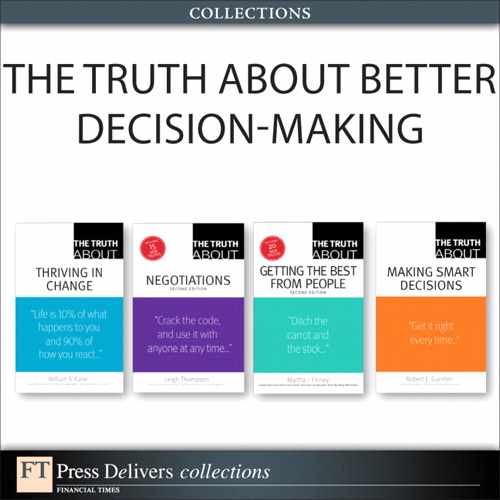Truth 32. How to negotiate with someone you love
Negotiating with someone you love, deeply respect, or have had a long-term relationship with is not always the walk in the park you might think it should be. Husbands and wives and dating couples are quite likely to settle upon lose–lose outcomes!
When we think about negotiations with people we love, there is a past, a present, and a future. When there is a lot at stake, emotions can run high. So it is best if you have a working approach.
Most of the negotiations we do in our personal lives with people that we love arise when we experience conflict. Conflict occurs when people perceive themselves to have incompatible interests involving scarce resources (for example, who gets the family car for the evening), goals (for example, where to go on a family vacation), or procedures (for example, how to discipline children).
Many of the business negotiations we’ve discussed in this book have focused on purely transactional (buyer–seller) relationships. The parties in those situations sought one another out because they saw an opportunity to make a trade. For example, a seller and buyer might see a mutual opportunity. Opportunity moves people to negotiate. However, people in long-term relationships are not brought together by business opportunity; instead, they step on each other’s toes and need to resolve conflict.
When it comes to conflict in personal relationships, your own view of what is going on in the relationship may not be at all what your partner thinks. Sometimes, conflict may not exist, but people feel that it does; other times, people are not aware that they have a conflict. Consider this table:

Note that when conflict actually exists and people perceive it, that is real conflict. When there is no actual conflict but people believe there is, that is a case of false conflict. Conversely, when conflict exists but people fail to perceive it, that is latent conflict.
Harmony speaks for itself!
Once you determine whether conflict is real, you need to decide what your reaction to it is going to be. According to psychologist Carol Rusbult and colleagues, there are four possible reactions: exit, loyalty, neglect, and voice.17
Exit occurs when one person leaves the relationship to seek greener pastures. When you exit a relationship, you actively exercise your BATNA.
When conflict actually exists and people perceive it, that is real conflict. When there is no actual conflict but people believe there is, that is a case of false conflict. When conflict exists but people fail to perceive it, that is latent conflict.
Loyalty means you stay with your partner and just tolerate him. It means that you accept his terms and capitulate. You might simply accept the first thing he suggests and never assert your own aspirations. People are often afraid that they will hurt or insult the other party, so they capitulate to the other party. We are often uncomfortable negotiating with people we love. This, of course, is the ultimate form of capitulating. People put their own interests on hold in personal relationships because they put a greater value or utility on resolving conflict than they do on the actual outcomes involved. When people do this over time, they may rationalize, or they may become resentful.
Neglect is a passive strategy for dealing with conflict. It occurs when parties are in a standoff or at an impasse. Neither a standoff nor an impasse is a real discussion, and neither is seeking greener pastures. Unfortunately, this holding pattern will certainly cause the relationship to deteriorate.
Voice occurs when people proactively try to talk about the conflict and make things better. Voice is an active strategy. It quite literally means that both parties articulate their concerns and views on the conflict. When it comes to voice, don’t underestimate the power of letting people vent and express themselves. Here are some of my favorite techniques for initiating a proactive discussion:
▪ “I need to talk to you about something that is bothering me. I want to try to work things out before I start feeling resentful.”
▪ “I feel uncomfortable talking about our finances (or car, travel schedules, household chores), but I am unhappy with our current situation and suspect you feel the same.”
▪ “The recent change in our finances (or travel schedules, work commitments, and so on) has led to some unanticipated and undesirable effects on me. I have some ideas to talk to you about how to make it better.”
